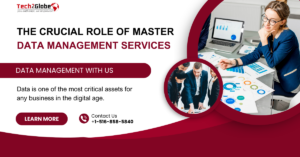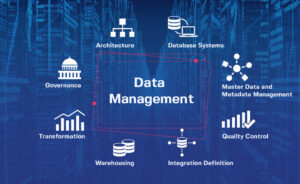With the assistance of data management, businesses may more easily organize and access the knowledge they have amassed through a variety of IT solutions. Data is crucial for every organization.
The majority of modern organizations are aware of the importance of data, and for small businesses, this typically means relying on the reports generated by the several software platforms they use on a daily basis. But eventually, it makes sense to compile all of this information into a single, standardized source. The method necessary to safeguard and organize this data is known as data management services.
What Is Data Management Exactly?
Data management services provider is the procedure used by businesses to gather, store, access, and protect data from various corporate software systems. Accessing data analytics, which offers the insights needed to optimize business operations and identify improvement opportunities, is made simpler by using data management. By developing a more effective framework for gaining access to the enormous volumes of data that any organization generates, businesses may improve their ability to provide customers with meaningful goods and services.
Nearly all software used in a contemporary business setting gathers data. These include, among others, customer relationship management (CRM) software, point-of-sale software, accounting software, and software for processing credit cards. These systems offer the organization access to a variety of data, including client information, financial data, and more.
How Does Data Management Work?
Before beginning to build a data management company policy, businesses must be aware of the resources at their disposal. Using cloud-enabled solutions can aid in the rapid creation of a data management platform. These cloud tools can be useful no matter where an organization’s data is located.
Additionally, data mining services should help standardize data so that it can be used for organizational goals. Various software platforms won’t collect data in the same way or even with the same objectives. Through data management, these data divisions are combined so they can be used together.
Developing A Data Management Strategy
Making a Enterprise data management plan should start with understanding your main business goals. Make a list of these goals, and after that, consider what data you are already gathering that is relevant to each one, noting any overlaps or information gaps. After making a complete list, think about the best way to store and organize the data for later retrieval.
To properly organize the massive volumes of data your company generates each day, you must tie it to your unique business objectives. These objectives will not only guide the collection and organization of data.

Best Data Management Practices
These outsource data management services best practices can improve the relationship between your firm and the data it collects and keeps, making it easy to access for use in simplifying business processes and ensuring that collection and usage comply with regulatory requirements and modern security standards.
- Maintain A Data Governance Crew
A significant and complex part of business operations is data administration. A knowledgeable and dedicated team of Outsource Data Management Services USA experts is required to handle it appropriately.
- Establish A Strategy For Data Compliance
As data privacy laws like the EU’s GDPR or California’s CCPA become increasingly common, compliance with them is crucial. The operations of your organization should benefit from your data management solution plan, but it should also be easily auditable so that regulators and business associates can verify that you are compliant.
- Regularly Review Your Data Security Policies
Any cybersecurity Professional Data Management Services will tell you that hostile actors are becoming more adept at breaking into networks and that the threat landscape is always shifting. Small businesses are easier targets for hackers because they frequently have less security than large organizations.
Conclusion
To know more about such things, make sure to follow Tech2Globe.










